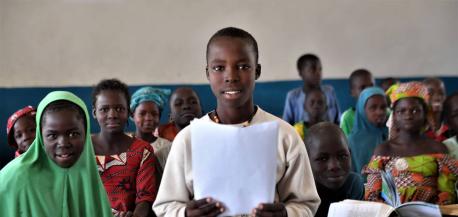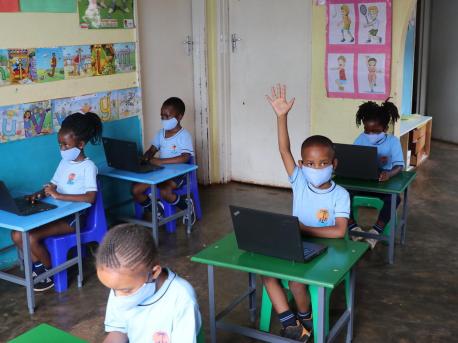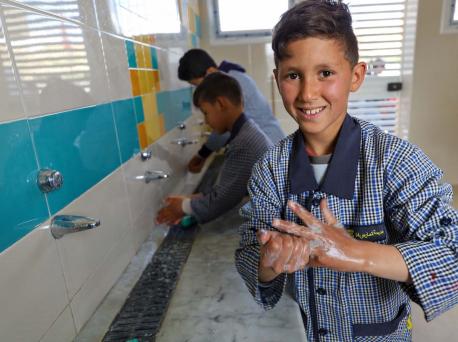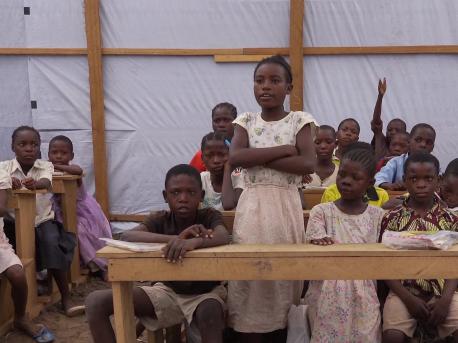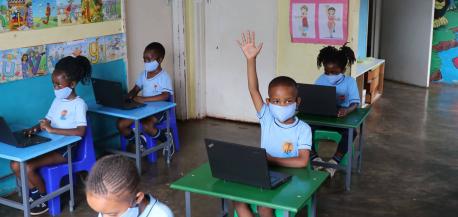
The Learning
Passport
Developed by UNICEF and Microsoft, this innovative mobile online/offline learning platform provides children with continuous access to quality education — no classroom required.
School can be a haven for children and young people growing up in poverty or areas torn apart by conflict, natural disasters and other emergencies. Going to school also empowers them to do the one best thing to secure their futures: learn. But when circumstances out of their control — like the COVID-19 pandemic — disrupt their education, vulnerable children lose significant ground and something else just as important — hope.
To help children keep up with their studies and hold fast to their dreams, UNICEF, Microsoft and partners developed the Learning Passport, a free online, mobile and offline platform that provides continuous access to quality education. It is also a highly flexible and adaptable e-learning platform that any country can adapt as part of their national learning management system or incorporate as a complement to existing platforms.
When the COVID-19 pandemic hit and schools shut down in over 190 countries, UNICEF, Microsoft and partners took full advantage of this flexibility to expand the Learning Passport. With over one billion kids' educations disrupted, solutions had to work for all students — those equipped to continue their schooling via online lessons and the most vulnerable who have no access to the tools and technology needed for remote learning.
In an extraordinary emergency response, the Learning Passport was scaled up to facilitate remote learning in countries with curriculums that could be taught online. As a result, the Learning Passport is reaching more than 2.2 million users in 23 countries, including Timor-Leste, Kosovo, Zimbabwe and Honduras, and in various stages of deployment in 25-plus more. Children and youth with internet connections and access to mobile phones, tablets, laptops or computers can now continue their studies — in their own languages — via a digitized curriculum with textbooks and a selection of supplemental content curated for their specific needs and their educators'. The Learning Passport also tracks progress for every student and guides them with little additional support required.
To serve the two-thirds of the world’s children between the ages of 3 and 17 with no internet access, the Learning Passport is also being made accessible offline, with plans to scale up deployments in 2022. Learners can connect any device with a web browser to an innovative hub device to access localized and global content.
The hub devices can also be set up in classrooms or learning centers in areas with low-to-no connectivity to give students access to high-quality educational content. The hub devices, which serve as cloud applications offline, can also store learners' records to ensure a progressive learning journey.
UNICEF is partnering with several global content providers to offer high-quality, supplementary content to countries. For example, UNICEF has developed content and tools focused on gender equity to enhance the Learning Passport's ability to challenge local gender norms that prevent girls from reaching their full potential.
"We need to recognize that investing in our children’s education pays dividends in safer, healthier societies. And therefore, it cannot ever be compromised." — Robert Jenkins, UNICEF Global Director of Education and Adolescent Development
An innovative tech solution for challenges learners, facilitators and education providers face, the Learning Passport was named one of TIME’s Best Inventions of 2021 and a finalist for Education and Developing-World Technology in Fast Company’s 2021 World Changing Ideas Awards.
Read more about how the Learning Passport is supporting every child's right to education.
Top photo: Girls in Zimbabwe study together using the Learning Passport, which offers content tailored to students’ first language and their specific curriculum needs.
